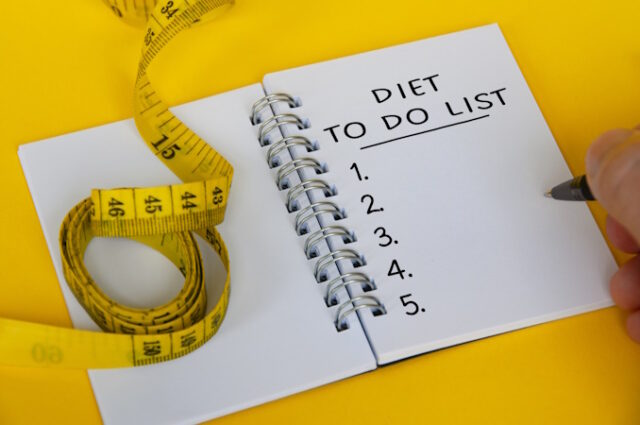
To lose weight and keep it off, experts recommend gradual weight loss using eating pattern changes and behavioral changes you can maintain over time.
There are a lot of choices when it comes to diet plans, supplements, medications, and fads, but what is the best way to lose weight in a healthy, sustainable way?
- Sustainable weight loss
- A month of weight loss
- Keeping it up
- Ways to help
- Foods to help
- Exercises
- Takeaway
What is the most sustainable way to lose weight?
There is no singular method of weight loss that works best for everyone.
Maintaining weight loss and your resulting moderate weight is not typically due to following a specific diet or program. Changes to your eating pattern, lifestyle, and physical activity patterns usually lead to weight loss and weight management.
Although there are programs and medications that can help you lose a substantial amount of weight in a short period, keeping it off can be more difficult. Long-term weight loss is usually a gradual process that does not involve using severe food restrictions.
Research published in 2018 notes that 20% of people who are overweight or who have obesity are successful in maintaining long-term weight loss.
In a review of 29 studies that looked at the sustainability of long-term weight loss, researchers found about half the weight study group lost returned within 2 years. By 5 years, study participants had gained back about 80% of the weight they initially lost.
What is a realistic amount of weight you can lose in a month?
People who are able to maintain their weight loss usually drop weight gradually, losing an average of 1–2 pounds per week over a longer period of time. That equates to about 4–8 pounds a month.
It’s typically not safe or recommended that you lose too much weight, short of having bariatric surgery. Weight loss surgery, or bariatric surgery, requires extensive counseling and careful monitoring, both of which healthcare professionals conduct.
While it may be possible to lose as much as 20 pounds in just 1 month following a fad diet, this type of extreme weight loss is not considered safe or sustainable. It’s always important that you discuss any weight loss goals and plans with a healthcare professional.
Can you keep up weight loss over time?
The key to maintaining weight loss is finding a plan that fits your lifestyle, is realistic, and is practical to maintain long-term.
Diets that heavily restrict your food intake or limit your eating plan to specific types of food can be difficult to adhere to over time. They may also compromise your nutritional status and overall health.
Long-term success with weight loss maintenance also depends on factors like:
- your personal and family health history and genetics
- stress and emotional factors
- behaviors involved with food intake
- activity habits like exercising
- environmental pressures and food availability
- socioeconomic issues
Weight loss happens a little differently for everyone, depending on things like genetics, age, and overall health. However, there are a few key concepts that generally apply.
- Set a goal and make a commitment: Making the choice to pursue weight loss and committing to the behavioral and lifestyle changes that it requires you to make is a critical first step.
- Review your situation: Figure out where you are on your weight loss journey and take a realistic look at what changes are required. Being honest with yourself about food habits, behaviors, and other factors that have led to your weight gain or that might make weight loss difficult is necessary.
- Set realistic goals and expectations: You may want to lose a lot of weight quickly, but this is not a sustainable or realistic weight loss goal. Setting realistic behavioral change goals that support your weight loss goals and encourage you to maintain them is important. Knowing that occasional setbacks, such as not meeting a goal, can be a part of your weight loss journey is important. Accepting this can help you plan for these potential setbacks and find encouragement to not give up if and when they happen.
- Identify resources and get support: Whether it’s a private company or counselor, friends, a support group, community organizations, or a healthcare team, it’s helpful to find weight loss guidance and information. Having someone to help keep you accountable, offer support when you need it, and motivate you can be powerful.
- Monitor your progress and be open and ready to make changes: The steps you take to lose weight might not stay the same throughout your journey. As you work on your weight loss goal, you can determine what works and what does not. Set aside time to reflect on what you are doing and how well it’s working. Then you can make any necessary changes.
You may consider working with a primary healthcare professional and a registered dietitian to make sure that any of your weight loss efforts also include adequate and balanced nutrition.
What foods can help you with sustainable weight loss?
There are no magical foods that help you lose weight or keep it off.
Your body processes different types of foods differently. It’s important to know that there are a few groups that can support or negatively affect weight loss.
Macronutrients refer to carbohydrates, fats, and proteins. Meanwhile, micronutrients are vitamins and minerals. They can both affect your weight loss outcomes.
Protein-rich foods do have a positive effect on weight loss, specifically on your body composition. Proteins can help you feel less hungry.
In contrast, foods high in fats, sugar, and carbohydrates generally work against weight loss and weight maintenance. Most people who are successful in maintaining weight loss avoid or limit these types of foods.
Eating too many higher calorie and refined carbs, such as baked goods, cereal, and white flour breads, typically does not provide much nutritional value and can sidetrack your weight loss efforts.
However, certain carbs — such as whole grains that are high in fiber — are an important and healthy part of any weight loss eating plan.
Exercises that can help
Any activity is good for you, especially when you’re just starting out. Your body automatically burns calories through daily living activities such as breathing. However, additional activities can help balance the effects of any extra energy you take in like foods.
How much and what type of physical activity, such as exercise, you need to do varies from person to person. It’s helpful to find physical activities that meet your needs, align with your performance ability, and inspire you to engage in them regularly.
For weight maintenance, the Centers for Disease Control and Prevention (CDC) recommends about 150 minutes of moderately intense aerobic activity each week. This can be 30 minutes of walking most days of the week or longer periods of intense exercise — like swimming or biking — less frequently.
Public health physical activity recommendations also include strength training 2 days a week.
The exact type and amount of physical activity you will need to lose weight and maintain that weight loss will depend on the type of physical activity you are doing, how often you’re doing it, and how much excess energy (calories) you are trying to burn.
Takeaway
Losing weight and keeping it off is a long-term process. There may be ways to drop a lot of weight quickly, but most people who go this route end up regaining the weight they lost. Also, rapid weight loss may result in negative health effects.
To lose weight safely and maintain the weight loss, experts recommend gradual weight loss using eating patterns and behavioral changes you can maintain long term.
This article originally appeared here and was republished with permission.












